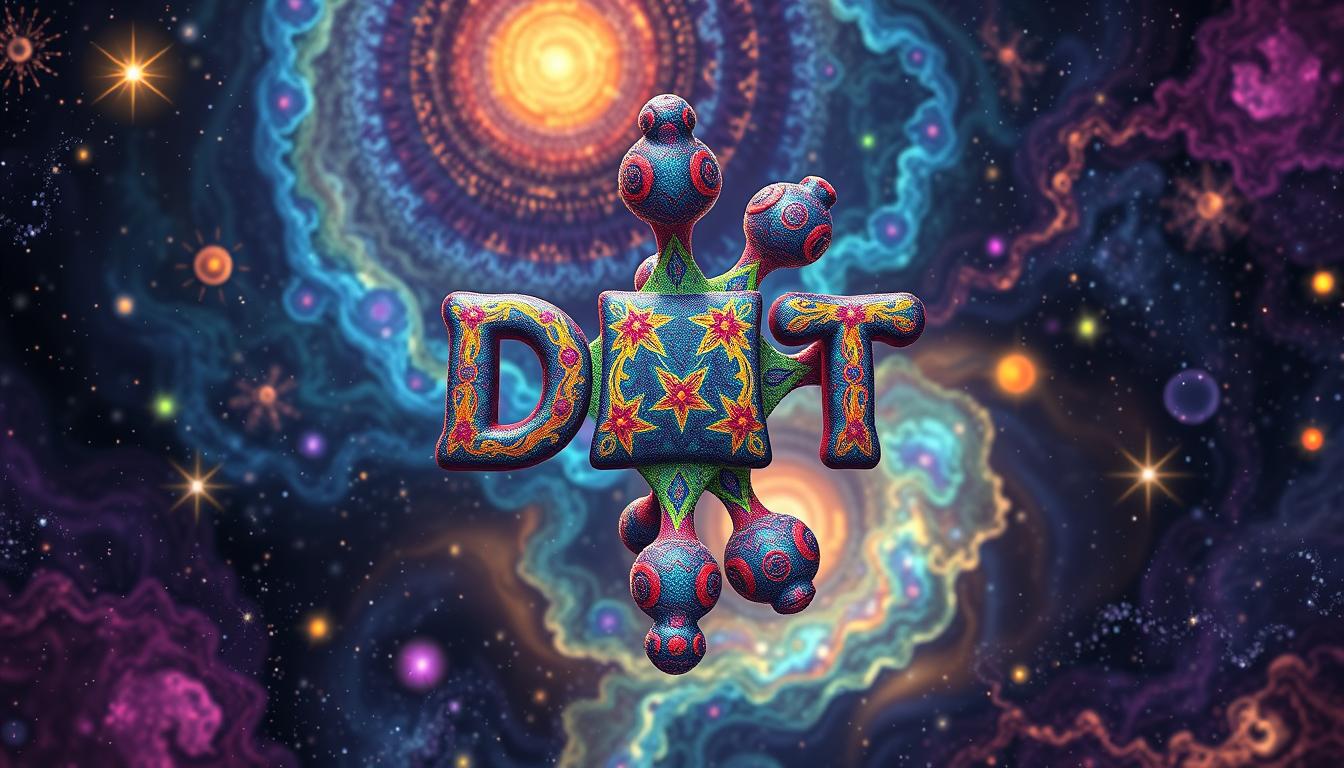Articles
DMT and Mental Health: Potential Benefits – Latest Research
Could DMT, a psychedelic compound, unlock new ways to treat mental health? Recent studies suggest it might. DMT works fast and doesn’t last long, unlike some other psychedelics. But what does the latest science say about DMT’s role in mental health?
A groundbreaking study showed DMT + harmine can reduce depression symptoms in just a week. This study is a big step forward for psychedelic therapy and consciousness expansion. As scientists learn more about DMT, mental health treatment could change a lot.
Key Takeaways
- Recent studies have shown DMT’s potent effects on depression and anxiety, with significant symptom reductions after just one week.
- The rapid onset and relatively short duration of DMT’s effects (approximately 20 minutes for IV administration) may offer pragmatic advantages over longer-acting psychedelics.
- Researchers are exploring the complex mechanisms behind DMT’s therapeutic benefits, which may involve changes in brain activity and connectivity.
- Ongoing research aims to further understand the psychotherapeutic applications of DMT, balancing its potent effects with appropriate safety considerations.
- The growing interest in psychedelic therapy and consciousness expansion highlights the need for continued exploration of compounds like DMT.
Introduction to DMT and Its Effects
Dimethyltryptamine, or DMT, is a naturally occurring psychedelic compound. It has profound effects on human consciousness. Found in plants and animals, including the human brain, it’s linked to spiritual experiences and altered states.
What is DMT?
DMT is a powerful psychoactive compound from the tryptamine family. It’s similar to serotonin and interacts with many brain receptors. This interaction leads to its intense psychedelic effects.
How DMT Interacts with the Brain
When DMT is taken, it quickly enters the brain. This leads to vivid visuals, spiritual experiences, and a changed sense of time and reality. The experience’s intensity and length depend on the dose, how it’s taken, and individual factors.
“DMT has the capacity to profoundly alter an individual’s perception of reality, leading to mystical experiences and a heightened sense of spiritual awareness.”
Research is ongoing to understand how DMT affects the brain’s neurotransmitter regulation. This could reveal new uses for this unique psychedelic.
Understanding Mental Health Challenges
Mental health issues like anxiety and depression are big problems worldwide. They cause a lot of disability. Traditional treatments, like medicine and therapy, don’t always work well. This is why people are looking into new ways, like psychedelic compounds like DMT.
Common Mental Health Disorders
Conditions like major depressive disorder and generalized anxiety disorder are common. They can really hurt a person’s life, making it hard to work, socialize, and live well.
Anxiety disorders make people worry too much or feel scared all the time. They can be generalized anxiety, social anxiety, or panic disorder. Depressive disorders, like major depressive disorder, make people feel sad, lose interest, and feel worthless or guilty.
The Role of Traditional Treatments
Traditional treatments, like talking therapy and medicine, help some people. But they can be slow to work, not always effective, and have side effects. This is why people are looking at new options, like psychedelic compounds like DMT. They might help those who haven’t found relief yet.
“The exploration of psychedelic therapy, including the use of DMT, has emerged as a promising approach to address the limitations of traditional mental health treatments.”
Researchers and healthcare providers are looking into DMT and other psychedelics. They want to see if these substances can help with anxiety, depression, and post-traumatic stress disorder.
DMT’s Mechanism of Action
Dimethyltryptamine (DMT) is a unique psychoactive compound. It interacts with the brain in complex ways. As a potent agonist at various serotonin receptors, DMT significantly impacts neurotransmitter regulation in the central nervous system.
This receptor activation affects the balance and activity of key neurotransmitters. These include serotonin, dopamine, and glutamate. This leads to the characteristic psychoactive effects of DMT.
Neurotransmitter Activity
DMT also interacts with other receptors, such as those for glutamate, dopamine, acetylcholine, sigma-1, and trace amine-associated receptors. This diverse pharmacological profile allows DMT to modulate a wide range of neurotransmitter systems. This may contribute to its profound impact on consciousness expansion and subjective experiences.
Impact on Brain Connectivity
The complex interplay of DMT with various neurotransmitter systems is believed to influence brain connectivity and neural network dynamics. By altering the balance and activity of these key signaling molecules, DMT may induce changes in functional brain connectivity.
This could lead to the observed alterations in perception, cognition, and emotional processing. These changes characterize the psychedelic experience.
“The psychedelic experience is characterized by a profound sense of unity, connectedness, and the dissolution of the ego. This may be linked to DMT’s impact on brain connectivity and neurotransmitter regulation.”
Research Overview: DMT and Mental Health
Recent studies have looked into DMT’s effects on mental health. A study found big drops in depression symptoms after DMT use. This shows its therapeutic applications. Another study checked DMT’s safety in a Phase I trial, showing its benefits.
Exploring DMT’s Therapeutic Potential
Researchers have also studied DMT with harmine, a natural mood booster. They found this mix might help with mental health. This could lead to new ways to use DMT for therapy.
“The study hypothesized that the DMT/Harmine formulation would be characterized by psychedelic phenomena and elicit psychological insights and emotional breakthroughs.”
As scientists learn more about DMT, we’re getting closer to using it for mental health. The future looks bright for DMT’s therapeutic applications.
The Therapeutic Potential of DMT
Recent studies have shown that DMT, a powerful psychedelic, could help with mental health. It’s found naturally in our brains and some plants. Research suggests it might help with depression and anxiety.
Anxiety and Depression Relief
A study with 30 people who had tried psychedotics found DMT helped with depression. The feelings of “Oceanic Boundlessness” from DMT were linked to better depression and anxiety symptoms. DMT works by affecting the 5-HT2A receptors, which might help with these conditions.
“The quality of acute experiences triggered by DMT, measured by the 5D-ASC subscale ‘Oceanic Boundlessness,’ was significantly correlated with a reduction in anxiety and depression symptoms.”
PTSD and Trauma Resolution
DMT-assisted therapy also looks promising for PTSD and past traumas. The deep introspective experiences it offers might help people see things differently. This could help them deal with and heal from past traumas.
More research is needed to fully understand DMT’s benefits. But, the current evidence is promising. It suggests DMT could be a powerful tool for mental health treatment and self-exploration.
DMT in Controlled Settings
Studies on N,N-dimethyltryptamine (DMT) have mostly been done in controlled settings. Trained facilitators are present to guide the process. These studies have shown how DMT affects the brain and its use in therapy.
The right setting and guidance are key. They ensure safety and help DMT work best for therapy.
Importance of Setting and Guidance
The setting where DMT is used greatly affects the experience. Researchers say a calm, supportive space is vital. This includes the physical area, lighting, music, and the presence of guides.
These guides help make the DMT session effective. They are experts in mental health and psychedelics.
Role of Trained Facilitators
Trained facilitators are critical in managing the DMT experience. They are mental health professionals with knowledge in psychedelic therapy. They help participants deal with DMT’s intense effects, ensuring their safety.
“The setting and the presence of a skilled facilitator can make all the difference in maximizing the therapeutic DMT and minimizing any risks,” explains a leading researcher in the field of psychedelic therapy.
With a controlled environment and expert guides, researchers aim to fully explore DMT’s benefits. They hope to treat mental health issues like anxiety, depression, and post-traumatic stress disorder.

Risks and Considerations
DMT’s therapeutic uses are promising, but we must look at the risks and side effects. It’s a Schedule I controlled substance in the United States. This means it has a high abuse risk and no accepted medical use. Surveys show more people are using DMT, including microdosing and lifetime use.
Possible Side Effects of DMT
DMT can cause physical and mental side effects. Physically, it might increase heart rate, make you dizzy, and affect muscle coordination. Mentally, it can lead to intense hallucinations, visual issues, and even paranoia. Its similarity to serotonin also increases the risk of serotonin syndrome with other serotonin drugs.
Identifying Appropriate Candidates
Finding the right people to use DMT is key due to its strong effects. Studies use psychedelic-experienced healthy volunteers for safety. But, DMT can cause severe side effects like coma and breathing problems. It’s important to use harm reduction strategies, like starting with small doses and avoiding drug interactions.
“Due to its illegal status, accessing reliable information on DMT’s safety and interactions can be challenging, with healthcare professionals typically discouraging its use and limited knowledge of mitigation strategies.”
As research on DMT’s therapeutic applications grows, we must weigh its benefits against risks. It’s important to make informed decisions when exploring DMT’s complex world.
Societal Perceptions of DMT
As scientists learn more about DMT, society’s views are changing. The fear of psychedelics is slowly fading, thanks to medical breakthroughs. This shift is most noticeable in the medical field.
Stigma Surrounding Psychedelics
Psychedelics have long been seen with distrust and fear. This view has blocked research into their healing powers. Yet, a study shows U.S. medical students are open to using psychedelics for mental health. They have a neutral to positive outlook.
Changing Attitudes in the Medical Community
Research on DMT and psychedelics is growing. This has sparked interest in the medical world. A study with 13 U.S. males showed they were curious and wanted to expand their consciousness. Their experiences exceeded their expectations.
While there’s more to do to overcome the stigma, the medical field is moving forward. The research on DMT and other psychedelics is promising. They might soon be used more in treating mental health issues.
DMT versus Other Psychedelics
DMT (N,N-Dimethyltryptamine) stands out in psychedelic therapy. It has a shorter effect time, lasting about 20 minutes when given intravenously. This makes it more suitable for therapy sessions. Also, DMT doesn’t cause quick tolerance, which means it could be used more often in treatment.
Psychedelic therapy and DMT’s uses are getting more attention. Studies suggest DMT could help with anxiety, depression, and addiction. Its unique traits might make it a key player in psychedelic-assisted therapy.
Comparison with Psilocybin
Psilocybin-assisted therapy also shows promise in treating depression. But DMT’s shorter effects might be an advantage in clinical settings. The length of a session is important in these environments.
Unique Benefits of DMT
DMT is known for its quick start and lack of tolerance. It can lead to deep insights and emotional breakthroughs. People often report positive lasting effects from DMT. Importantly, DMT doesn’t seem to cause harm or negative effects in controlled studies.

“The unique characteristics of DMT may position it as a valuable tool in the expanding field of psychedelic-assisted therapy.”
Future Research Directions
Researchers are diving deeper into N,N-Dimethyltryptamine (DMT) to find its full healing power. They want to see how DMT can help with mental health issues. They also aim to find the best ways to use DMT and study its long-term effects.
By learning more about how DMT works, scientists hope to find new ways to help people’s minds. This could lead to better treatments for mental health problems.
Areas for Further Exploration
One big area of study is how DMT affects the brain. Recent studies have shown that DMT can change brain activity. This could help with depression and anxiety.
Researchers want to learn more about these changes. They hope to find new ways to use DMT to help people.
Goals for Upcoming Clinical Trials
Future studies will look at how to use DMT best. They will also study its effects over time. The goal is to see if DMT can help with mental health issues like PTSD and mood disorders.
These trials will use new technology to understand DMT’s effects. This will help scientists learn more about how to use DMT to help people.
“The future of DMT research holds immense promise, as we strive to unlock its full therapeutic benefits and improve the lives of those struggling with mental health challenges.”
As scientists keep studying DMT, we can expect big changes in mental health care. By carefully studying DMT, researchers can find new ways to help people. This could lead to better treatments for mental health issues.
Personal Experiences and Anecdotes
DMT, a natural compound in our brains and plants, leads to deep spiritual experiences. People who try DMT talk about meeting beings, seeing reality differently, and gaining insights into consciousness.
Testimonies from DMT Users
Jonathan Bell has used DMT hundreds of times, starting at 34. Alexander Shulgin, a famous researcher, said DMT changed him in seconds, breaking all his old views. It’s called the “god molecule” for its spiritual effects.
Shared Experiences in Clinical Studies
In studies, people often meet “beings” on DMT. Roland Griffiths from Johns Hopkins says DMT changes how we feel deeply. It might help with depression and anxiety.
A study in the Journal of Psychopharmacology showed 41% felt fear, but many atheists became believers after trying DMT. These stories show DMT’s power to connect us and explore ourselves.
Conclusion: Balancing Potential and Caution
Research on DMT for mental health shows promise. It has helped reduce symptoms of depression, anxiety, and PTSD. This offers hope for those who haven’t found relief with traditional treatments.
DMT’s unique qualities make it interesting for therapy. It acts quickly and doesn’t build up tolerance fast. This could be a big plus for treating mental health issues.
Summary of Key Benefits
DMT might be great for treating depression that doesn’t respond to usual treatments. Studies show it could help up to 50% of people. It could also quickly help with severe symptoms like suicidal thoughts.
The Importance of Continued Research
Even with promising results, we must be careful and keep researching. More studies are needed to fully understand DMT’s benefits and risks. This will help ensure it’s safe for patients.
By being cautious and evidence-based, we can unlock DMT’s full therapeutic power. This way, we prioritize patient safety and well-being.


